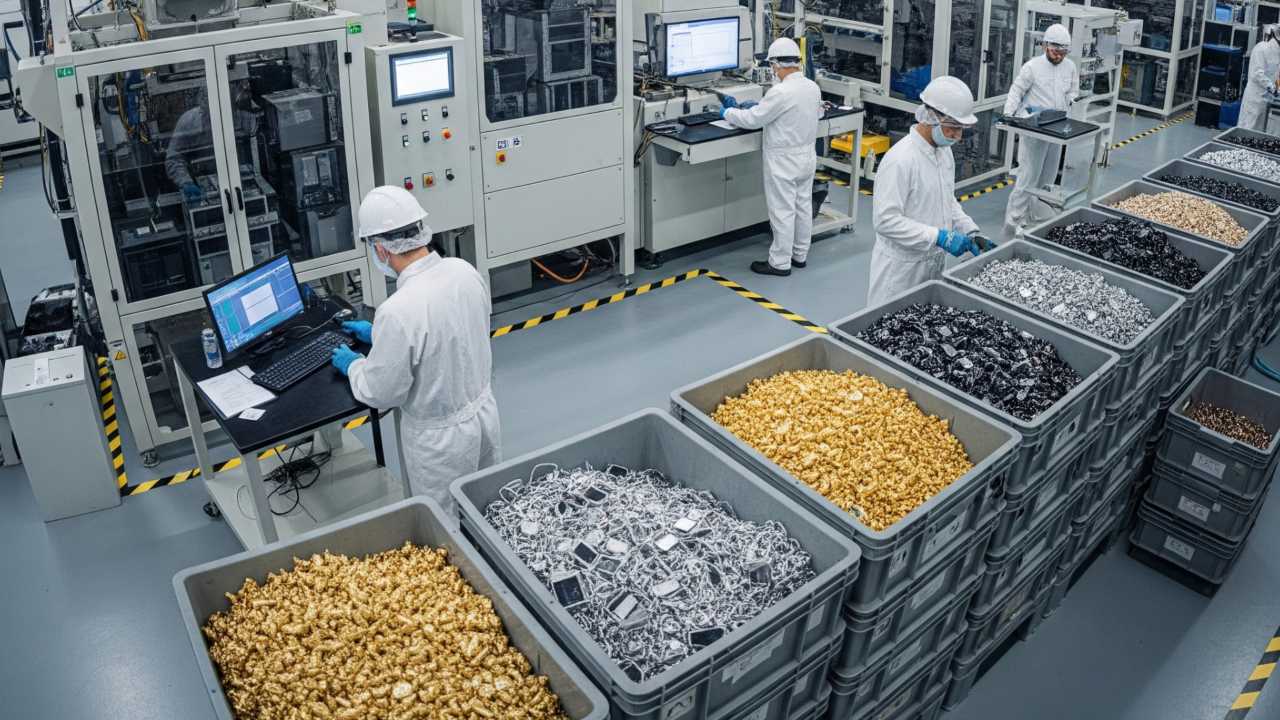Jewelers: Maximize Profits with In-House Gold Refining
In the glittering world of jewelry, where artistry meets commerce, a quiet revolution is taking place. Many jewelers are discovering a powerful secret weapon that can significantly boost their profits, improve their supply chain, and even enhance their brand image: in-house gold refining.
For generations, the default practice for jewelers has been to send their scrap gold, old jewelry, and even their precious filings and dust (known as “sweeps”) to external refiners. While this system has its merits, it also comes with hidden costs and missed opportunities. By taking the refining process into their own hands, jewelers are unlocking a treasure trove of benefits that were previously out of reach.
This article will explore in detail how jewelers can benefit from in-house gold refining, breaking down the advantages into easily understandable points and offering practical insights for those considering this transformative step.
The Hidden Costs of Outsourcing: Why Jewelers Are Looking Inward
Before diving into the benefits of in-house refining, it’s crucial to understand why many jewelers are starting to question the traditional outsourcing model.
- Refining Fees and Charges: External refiners charge a percentage of the recovered gold as their fee, along with additional charges for melting, assaying (determining purity), and processing. These fees, while seemingly small individually, can add up significantly over time, directly eating into a jeweler’s profits.
- Loss During Transit: Shipping valuable gold scrap carries inherent risks. While insurance helps, the worry of loss or theft during transit is a constant concern.
- Delayed Payments and Cash Flow: It can take weeks, sometimes even months, for external refiners to process the gold and issue payment. This delay ties up capital that could otherwise be used for purchasing new inventory, investing in marketing, or covering operational costs.
- Lack of Transparency: Jewelers often have to trust the external refiner’s assessment of their gold’s purity and weight. While reputable refiners are trustworthy, a lack of direct oversight can lead to questions and a feeling of being disconnected from a crucial part of their business.
- Environmental Impact: Sending materials to external refiners often involves long-distance transportation, contributing to a larger carbon footprint.
By bringing refining in-house, jewelers address these challenges head-on, transforming them into opportunities.
The Glittering Advantages of In-House Gold Refining
Let’s explore the myriad ways in which in-house gold refining can empower jewelers.
Maximizing Profit Margins: Keeping More Gold, Making More Money
This is arguably the most compelling reason for jewelers to refine in-house.
- Eliminating Refining Fees: The most direct financial benefit is the complete elimination of fees charged by external refiners. Every gram of gold recovered in-house is a gram that isn’t subject to a third-party charge, directly increasing the jeweler’s net profit.
- Recovering More Usable Gold: External refiners operate on a large scale and their processes, while efficient, may not always be optimized for maximizing recovery from smaller, diverse batches of jeweler’s scrap. In-house, jewelers can fine-tune their process to ensure a higher yield from their materials, including even the smallest particles from sweeps and polishing dust.
- Reducing “Hidden Losses”: When you send gold out, there can be subtle losses in transit or during the handling process that you might not even be aware of. Keeping the material in-house significantly reduces these unseen losses.
- Directly Reusing Refined Gold: Instead of selling refined gold back to a supplier or waiting for payment, jewelers can directly use the purified gold in their own manufacturing processes. This creates a closed-loop system, saving them from having to purchase new gold for their creations and further boosting their profit margins. Imagine crafting a custom piece with gold you refined yourself – it’s a powerful statement of self-sufficiency and efficiency.
Enhanced Cash Flow and Financial Control: Gold on Your Terms
- Immediate Access to Refined Gold: Once the refining process is complete, the jeweler has immediate access to the purified gold. There’s no waiting for external refiners to process, pay, or ship. This instant availability is a game-changer for cash flow.
- Faster Inventory Turnover: With quick access to refined gold, jewelers can produce new pieces faster, leading to quicker sales and a healthier inventory turnover. This means capital is not tied up in raw materials for extended periods.
- Reduced Need for External Gold Purchases: By continuously refining their own scrap, jewelers reduce their reliance on purchasing new gold from external suppliers. This not only saves money but also provides a buffer against price fluctuations in the global gold market.
- Strategic Use of Capital: Instead of having capital tied up in gold waiting to be refined externally, jewelers can allocate these funds to other critical areas of their business, such as marketing, new equipment, or expanding their product lines.
Quality Control and Purity Assurance: Trusting Your Own Gold
- Precise Purity Verification: In-house refining gives jewelers complete control over the purity of their gold. They can conduct their own assays and ensure that the refined gold meets their exact specifications, whether it’s 24K, 18K, or another desired purity. This level of control is simply not possible when outsourcing.
- Consistency in Production: Knowing the exact purity of their gold ensures consistency in their manufacturing processes. This is especially crucial for casting, where precise alloy ratios are essential for achieving desired hardness, color, and workability.
- Building Customer Trust: When a jeweler can confidently say that they refine their own gold, it adds a layer of transparency and trustworthiness to their brand. Customers appreciate knowing the origin and quality of the materials used in their jewelry.
Sustainability and Ethical Sourcing: A Story to Tell
In today’s socially conscious market, ethical sourcing and sustainability are increasingly important to consumers. In-house refining offers a powerful advantage in this regard.
- Closed-Loop System: By refining their own scrap, jewelers create a closed-loop system. They are essentially recycling and reusing existing gold, minimizing the need for newly mined gold. This significantly reduces their environmental footprint.
- Reduced Transportation: Less reliance on external refiners means fewer shipments of precious metals, leading to a reduction in transportation-related carbon emissions.
- Transparent and Traceable Gold: Jewelers can trace the origin of their refined gold back to their own operations. This level of transparency is highly valued by consumers who are concerned about responsible sourcing. They can confidently tell a story about their commitment to ethical practices.
- Enhanced Brand Image: Marketing a business as “sustainable” and “ethically sourced” through in-house refining can be a significant differentiator in a competitive market. It appeals to a growing segment of consumers who prioritize these values.
Operational Efficiency and Flexibility: Streamlining Your Workflow
- Reduced Lead Times: No more waiting for external refiners. Jewelers can refine gold on their own schedule, allowing for quicker turnaround times on custom orders and new product development.
- Inventory Management: In-house refining simplifies inventory management. Jewelers have a clear picture of their available refined gold at all times, making it easier to plan production and manage stock levels.
- Adaptability to Demand: If there’s a sudden surge in demand for a particular type of gold jewelry, jewelers can quickly refine the necessary gold in-house, rather than waiting for an external supplier.
- Reduced Administrative Burden: Less paperwork, fewer invoices, and simpler logistics compared to dealing with external refiners.
Intellectual Property and Security: Protecting Your Assets
- Keeping Valuables On-Site: One of the most significant security benefits is keeping valuable gold on the premises. This eliminates the risks associated with shipping highly valuable materials to external facilities.
- Protection of Trade Secrets: The specific techniques and proprietary alloys used by jewelers are often considered trade secrets. By refining in-house, jewelers maintain full control over these processes, preventing any potential exposure to third parties.
- Peace of Mind: Knowing that your precious materials are under your direct supervision and control provides immense peace of mind.
Educational and Skill Development: Empowering Your Team
- New Skill Sets: Implementing in-house refining requires jewelers and their staff to learn new skills, including understanding chemical processes, operating specialized equipment, and performing assays. This investment in knowledge can be a valuable asset to the business.
- Deeper Understanding of Materials: A hands-on approach to refining provides a deeper understanding of gold and its properties, which can inform design choices and manufacturing techniques.
- Employee Engagement: Offering opportunities for skill development can increase employee engagement and job satisfaction.
Considerations for Setting Up In-House Gold Refining
While the benefits are substantial, setting up an in-house gold refining operation requires careful consideration and planning.
- Initial Investment: There will be an upfront cost for equipment, including melting furnaces, refining tanks, safety equipment, and assaying tools. This investment should be weighed against the long-term savings and increased profits.
- Space Requirements: A dedicated, well-ventilated space is essential for a refining operation.
- Training and Expertise: Jewelers or their staff will need to acquire the necessary knowledge and skills for safe and efficient gold refining. This might involve formal training courses or seeking advice from experienced refiners.
- Safety Protocols: Working with chemicals and high temperatures requires strict adherence to safety protocols. Proper ventilation, personal protective equipment (PPE), and emergency procedures are paramount.
- Environmental Regulations: Jewelers must comply with local and national environmental regulations regarding waste disposal and chemical handling. This might involve obtaining permits or adhering to specific guidelines.
- Scale of Operation: The size and complexity of the refining setup will depend on the volume of gold to be processed. Jewelers might start with a smaller, more manageable system and scale up as their needs grow.
- Choosing the Right Method: There are various gold refining methods, each with its pros and cons (e.g., aqua regia, electrolytic refining). Jewelers will need to research and choose the method best suited for their needs and resources.
The Future is Bright: A Strategic Move for Modern Jewelers
In-house gold refining is no longer a niche practice reserved for large-scale operations. Advancements in technology and a growing emphasis on sustainability and efficiency have made it an increasingly viable and attractive option for jewelers of all sizes.
By embracing this transformative approach, jewelers can:
- Significantly boost their profit margins.
- Gain greater financial control and improved cash flow.
- Ensure the highest quality and purity of their gold.
- Build a stronger, more sustainable, and ethically responsible brand.
- Enhance operational efficiency and flexibility.
- Increase security and protect their valuable assets.
- Invest in the skills and knowledge of their team.
In a competitive market, differentiation is key. For jewelers, the ability to say “we refine our own gold” is a powerful statement. It speaks to quality, integrity, sustainability, and ultimately, a deeper commitment to their craft and their customers. The glitter of success in the jewelry industry may increasingly come from the gold refined right within their own walls.









